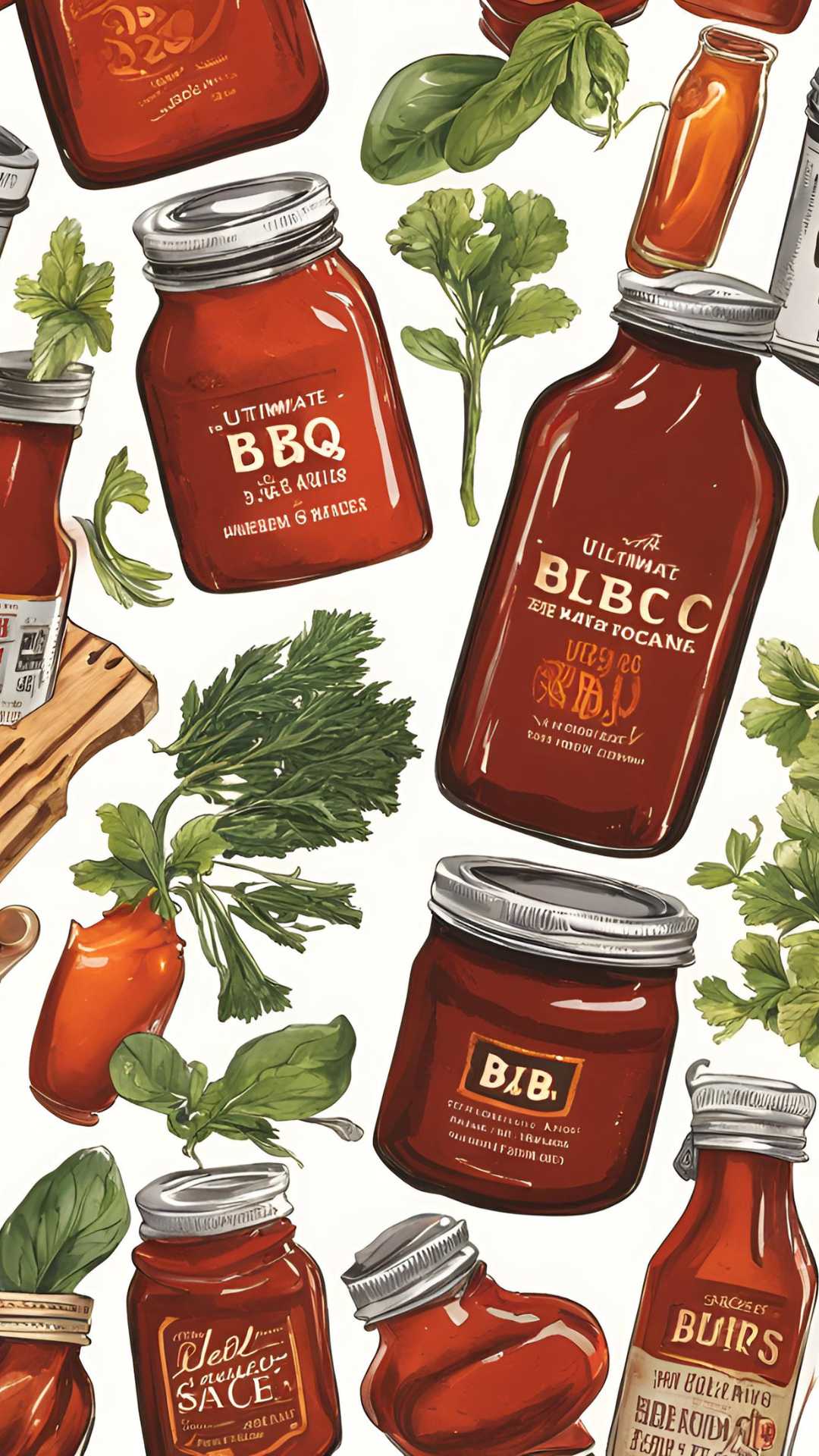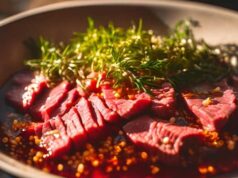- Key Takeaways:
- History of BBQ Sauces and Marinades
- Types of BBQ Sauces
- Types of Marinades
- Key Ingredients in BBQ Sauces and Marinades
- How to Make Your Own BBQ Sauce
- How to Prepare Your Own Marinade
- What to Look for When Buying BBQ Sauces
- Using BBQ Sauces and Marinades: Best Practices
- Storage and Shelf Life of BBQ Sauces and Marinades
- Do BBQ Sauces and Marinades Need to Be Refrigerated?
- Health Considerations: Are BBQ Sauces Gluten-Free?
- Combining Sauces and Marinades for Unique Flavors
- Tips for Elevating Your Grilling Game with BBQ Sauces and Marinades
- Frequently Asked Questions
Grilling season is here, and there is no better way to enhance your outdoor cooking than with the ideal BBQ sauces and marinades.
In this comprehensive guide, you will delve into the history and variety of these flavorful additions, ranging from traditional classics to innovative creations.
You will learn how to craft your own sauces, discover essential ingredients, and receive guidance on storage and health considerations.
Whether you are a novice or an experienced grill master, this guide will assist you in bringing unforgettable flavors to your next cookout.
Key Takeaways:
- Discover the rich history and different types of BBQ sauces and marinades – from traditional to international flavors.
- Learn how to make your own sauces and marinades using key ingredients for customized and flavorful grilling.
- Elevate your grilling game with expert tips on proper usage, storage, and unique flavor combinations of BBQ sauces and marinades.
History of BBQ Sauces and Marinades
The history of BBQ sauces and marinades is rich and diverse, tracing back centuries and reflecting regional tastes and ingredients that vary across cultures and communities. From the tangy vinegar-based sauces of the Carolinas to the sweet and smoky profiles characteristic of Kansas City-style sauce, each unique recipe showcases the local flavors and traditions that have influenced barbecue cooking over time.
These variations not only reveal the preferences of different regions but also illustrate how cultural exchanges have transformed simple ingredients into complex flavor profiles. In Memphis, for instance, the use of tomato and molasses creates a thick, sticky sauce that complements the rich, slow-cooked meats typical of the area. Conversely, some regions in Texas emphasize a no-sauce approach, relying instead on rubs made from a blend of spices to enhance the natural flavors of beef brisket.
Through the careful combination of vinegar, spices, and sweetness, BBQ enthusiasts continue to reinvent classic recipes, ensuring that the tradition of barbecue remains vibrant and relevant as it adapts to modern tastes.
Types of BBQ Sauces
BBQ sauces are available in a variety of types, each distinguished by its unique flavor profile and regional identity, making them an essential component of grilling and barbecuing. From the sweet and thick Kansas City-style sauce to the vinegar-forward and tangy Carolina-style sauce, each type offers distinct flavors that complement different meats and cooking methods, enhancing your overall grilling experience.
For example, the Carolina mustard-based sauce provides a delightful zing with its blend of yellow mustard, vinegar, and spices, making it an excellent pairing for pulled pork. Conversely, Alabama white sauce, which is mayonnaise-based, adds a creamy richness that pairs beautifully with smoked chicken.
The southwestern-style BBQ sauce introduces a spicy kick with ingredients like chipotle and jalapeño, catering to those who prefer a more intense grilled flavor. The diverse range of BBQ sauces not only elevates the taste of grilled dishes but also reflects the culinary traditions of their respective regions.

Types of Marinades
Marinades play a crucial role in flavoring and tenderizing meats, seafood, and even vegetables, offering a wide array of options to accommodate various culinary preferences. From straightforward vinegar-based marinades that impart a tangy zest to more intricate blends featuring soy sauce and spices, the assortment of marinades available allows for extensive experimentation and customization in your grilling and cooking endeavors.
These flavorful mixtures typically include acidic components such as citrus juice or yogurt, which help break down proteins and lead to tenderized meat. For example, a classic chimichurri made with fresh herbs, garlic, and olive oil can infuse grilled steak with a vibrant freshness that enhances the rich flavors of beef.
On the vegetable side, a balsamic vinaigrette can elevate grilled zucchini and bell peppers by adding a sweet and tangy essence, while a spicy jerk marinade brings depth to chicken or pork, enhancing the overall grilling experience. Ultimately, selecting the right marinade can transform a simple meal into a culinary delight.
Key Ingredients in BBQ Sauces and Marinades
Key ingredients in BBQ sauces and marinades are essential for achieving the perfect blend of flavors that can elevate your grilled dishes into culinary masterpieces. Elements such as vinegar, brown sugar, and a variety of spices not only enhance the taste but also provide potential health benefits, including antioxidants and vitamins, ensuring your cooking is both delicious and nutritious.
Plus these foundational components, incorporating tomatoes—whether in the form of ketchup or puree—adds a rich depth of flavor while supplying lycopene, a powerful antioxidant. Mustard contributes a tangy zest that can enhance the overall flavor profile, while ingredients like garlic and onion not only amplify taste but also offer anti-inflammatory properties.
Incorporating Worcestershire sauce can provide a savory umami burst that balances the sweetness of brown sugar, resulting in a well-rounded taste experience. Collectively, these ingredients harmonize to create sauces that not only tantalize the taste buds but also offer beneficial elements, making them essential in the realm of BBQ.
How to Make Your Own BBQ Sauce
Creating your own BBQ sauce at home is a gratifying process that enables you to customize flavors to your preferences, resulting in a preservative-free sauce that aligns with your unique taste. By combining ingredients such as vinegar, brown sugar, and spices like smoked paprika and cayenne pepper, you can formulate a sauce that enhances your grilled meats and adds a personal touch to your cookouts.
This culinary venture not only allows you to explore various recipes but also ensures you can adjust the sweetness, tanginess, or spiciness to suit your palate. To begin crafting a classic tomato-based BBQ sauce, use one cup of ketchup as your base, then incorporate a quarter cup of apple cider vinegar, three tablespoons of brown sugar, and a tablespoon of Worcestershire sauce.
If you desire a smoky flavor, adding a teaspoon of liquid smoke can elevate your sauce. You may also want to experiment with different herbs such as thyme or rosemary for a distinctive twist, ensuring each batch reflects your cooking style and is tailored to your gatherings.
How to Prepare Your Own Marinade
Preparing your own marinade allows you to infuse meats, seafood, and vegetables with rich flavors while ensuring that you know exactly what goes into your dish. By mixing ingredients such as apple cider vinegar, Worcestershire sauce, and a variety of spices, you can create a marinade that enhances the texture and taste of your ingredients, which makes your grilled dishes truly stand out.
Plus these staples, consider incorporating citrus juices like lemon or lime for a zesty kick, or honey and soy sauce for a touch of sweetness that complements chicken and pork beautifully. The key to a successful marinade lies in balancing acidity, oil, and flavorings, which can dramatically alter the final outcome of your cooking.
For instance, a yogurt-based marinade can tenderize delicate seafood while infusing it with a creamy richness, whereas a vinegar-based marinade excels with tougher cuts of beef, breaking down fibers for a more tender bite. Experimenting with fresh herbs, garlic, and various types of peppers allows you to personalize the flavor profile, catering to specific cuisines or preferences.
What to Look for When Buying BBQ Sauces
When purchasing BBQ sauces, it is essential to identify key factors that ensure you choose a product that not only tastes excellent but also aligns with your dietary preferences. Consider looking for ingredient lists that are free from preservatives and artificial additives. Additionally, the flavor profile of the sauce should ideally complement your cooking style and the type of meat or vegetables you intend to grill.
For health-conscious shoppers, it is important to pay close attention to sugar content. Opting for sauces that feature natural sweeteners or lower sugar levels can help you avoid unnecessary calories.
Another critical element to consider is the level of spiciness. While some may prefer a milder taste, others may seek the excitement of a robust, spicy kick.
Exploring various flavor profiles—such as smoky, tangy, or sweet—can significantly enhance your grilling experience. Encouraging your palate to embrace new and unique combinations can lead to exciting culinary possibilities.
Always remember to read the labels carefully, as making informed choices contributes to healthier eating habits without sacrificing flavor.
Using BBQ Sauces and Marinades: Best Practices
Using BBQ sauces and marinades effectively can elevate your grilling game and enhance the flavors of your dishes, but it is essential to adhere to best practices to achieve optimal results.
One key practice for advanced grilling enthusiasts is to apply BBQ sauce at the right times, particularly during the last few minutes of cooking. This approach prevents the sugars in the sauce from burning while allowing the flavors to meld beautifully with the meat.
Marinating proteins for several hours, or even overnight, not only infuses them with flavor but also helps to tenderize tougher cuts, resulting in a juicy bite.
Flavor customization is another exciting aspect; consider combining your favorite sauces with spices or citrus juices to create a unique profile that complements each type of meat or vegetable.
Do not hesitate to experiment with different application methods like basting or brushing, as these techniques can significantly influence the taste and appearance of the finished dish.
Storage and Shelf Life of BBQ Sauces and Marinades
Understanding the proper storage and shelf life of BBQ sauces and marinades is essential for maintaining their flavor and ensuring safety for consumption. Most homemade sauces can typically be stored in the refrigerator for several weeks, while store-bought varieties often contain preservatives that extend their shelf life. It is crucial to know how to preserve your unique flavors without compromising on quality.
To ensure longevity, it is advisable to store these sauces in airtight containers to prevent exposure to air, which can lead to spoilage and off odors. Utilizing glass containers is particularly beneficial, as they do not retain odors or flavors like plastic can. Regularly checking for signs of deterioration, such as changes in texture, color, or aroma, is also important.
Fresh, quality ingredients significantly impact the overall taste and longevity of your sauces. Always label your containers with dates to keep track of freshness and enjoy your BBQ creations safely.
Do BBQ Sauces and Marinades Need to Be Refrigerated?
The question of whether BBQ sauces and marinades require refrigeration often arises, particularly concerning homemade versions that do not contain preservatives. While many store-bought BBQ sauces can safely be stored at room temperature due to their preservatives, it is generally advisable to refrigerate homemade sauces to prevent spoilage and maintain the integrity of their fresh flavors.
This precaution is particularly important because homemade sauces, which may contain ingredients like fresh herbs, garlic, or vinegar, can be more prone to bacterial growth. For those preparing their own sauces, it is recommended to store them in airtight containers in the refrigerator and to consume them within a week or two.
In contrast, commercially produced products can often remain safe to eat for a more extended period when kept unopened in a pantry. Spoilage can typically be identified by changes in color, off odors, or separation. Keeping sauces chilled not only helps prevent these issues but also preserves the flavors, enhancing the overall taste experience during barbecues or grilling.
Health Considerations: Are BBQ Sauces Gluten-Free?
Health considerations play a crucial role when selecting BBQ sauces, especially for individuals with dietary restrictions or sensitivities, such as gluten intolerance. While many BBQ sauces can be gluten-free, it is essential for you to carefully read ingredient labels to confirm that no gluten-containing components, including certain seasonings or preservatives, are included in your preferred sauces.
With a vast array of options available in grocery stores, it can be overwhelming to navigate sauces tailored to various dietary needs. Many brands now offer specialized sauces specifically designed for gluten-free diets; however, it is important to note that not all are created equal. You should seek out certifications or labels that clearly indicate gluten-free status, as cross-contamination can occur during production.
Additionally, some sauces may contain added sugars, preservatives, or other allergens that could impact your overall health. By being mindful of these ingredients, you can make informed decisions, ensuring that your BBQ experience remains both enjoyable and safe, regardless of any dietary restrictions you may have.
Combining Sauces and Marinades for Unique Flavors
Combining different BBQ sauces and marinades can lead to unique flavors that enhance your grilling experience and surprise your taste buds with delightful new profiles. By experimenting with various ingredients—such as mixing sweet and spicy sauces or incorporating tangy vinegar into richer marinades—you can create signature blends that reflect your culinary style and elevate any cookout.
Whether you prefer a smoky chipotle sauce or a fruity mango glaze, the possibilities are truly enticing. You might also consider adding fresh herbs or citrus zests to further customize your blends. For instance, a splash of lime juice can brighten a heavy sauce, while a hint of bourbon can introduce a rich sweetness that complements meats like ribs or brisket.
You can encourage others to join in the fun by hosting a sauce creation competition at your next gathering. This way, everyone can share their unique creations, inspiring culinary adventures and mouthwatering discoveries.
Tips for Elevating Your Grilling Game with BBQ Sauces and Marinades
Elevating your grilling game with BBQ sauces and marinades requires a combination of knowledge, skill, and creativity, enabling you to transform ordinary meats and vegetables into extraordinary culinary delights. Mastering techniques such as proper application, flavor balancing, and ingredient harmonization will not only enhance the taste of your dishes but also impress your guests during cookouts and tailgate parties.
By experimenting with various marinades, you can discover unique flavor profiles that complement each type of protein or vegetable perfectly. It is beneficial to marinate meats for at least a few hours, or ideally overnight, to ensure the flavors penetrate deeply. Utilizing a mix of sweet, spicy, and tangy BBQ sauces can create a rich layer of depth—consider combining honey and sriracha for an excellent kick.
Presentation also plays a crucial role; brushing on a glaze right before finishing on the grill provides a beautiful, glossy finish that makes every dish look appetizing. Remember, grilling is not just about taste; it is about crafting an experience.
Frequently Asked Questions
What is the difference between BBQ sauce and marinade?
BBQ sauce is usually thicker and sweeter, while marinade is thinner and more acidic. BBQ sauce is typically used as a finishing sauce, while marinade is used to add flavor and tenderize meat before cooking.
Can BBQ sauce be used as a marinade?
Yes, BBQ sauce can be used as a marinade, but it may not be as effective as a traditional marinade. BBQ sauce tends to have a higher sugar content, which can burn easily when used as a marinade. It is best to use a marinade specifically designed for that purpose.
What ingredients should I look for in a good BBQ sauce or marinade?
For a good BBQ sauce, look for ingredients like tomato paste, garlic, onion, vinegar, and a variety of spices. For a marinade, look for ingredients like citrus juices, soy sauce, honey, and herbs. Avoid sauces and marinades with high fructose corn syrup or artificial additives.
How do I apply BBQ sauce or marinade to my meat?
For BBQ sauce, brush it on the meat during the last 10-15 minutes of grilling, or as a finishing glaze after the meat is cooked. For marinade, place your meat in a plastic bag or container, cover it with the marinade, and let it sit for at least 30 minutes before cooking.
Can I make my own BBQ sauce or marinade?
Yes, you can make your own BBQ sauce and marinade at home using simple ingredients. This allows you to customize the flavor and control the ingredients. Look for recipes online or experiment with your own combinations of spices and sauces.
How can I use BBQ sauce and marinade to elevate my grilling game?
By using high-quality, flavorful BBQ sauces and marinades, you can add depth and complexity to your grilled dishes. Experiment with different flavors and combinations, and don’t be afraid to get creative. Also, don’t forget to let your meat marinate for the recommended amount of time to ensure it is tender and flavorful.



















































